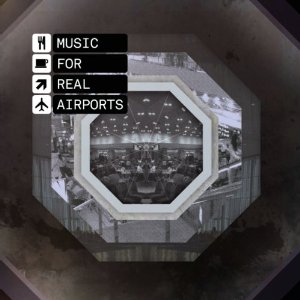Martin Dust didn’t hear much realism when he first encountered Music For Airports. He understood the utopian vision its producer was trying to evoke, but he did not recognise it. To Martin Dust, in clanking 1979 Sheffield, Brian Peter George St John le Baptiste de la Salle Eno’s Music For Airports sounded like science fiction.
Much has changed since then. Martin Dust is now part of The Black Dog, with founding member Ken Downie and Richard Dust. Airports no longer symbolise the democratisation of travel, if they ever did. Sheffield doesn’t clank quite like it used to.
The Black Dog – Music For Real Airports – SomaCD083 by somaAirports have always occupied curious conceptual territory. They facilitate the individual’s right to travel, while visibly imposing the strictures required by international security. They have been a conspicuous point of intersection between the free market and nationalised industry. They help sate wanderlust, although the deep-rooted romance of air travel was irrevocably damaged by 9/11.
In a recent interview for FACT Martin Dust said: "I think there’s a lot of joy to be had in airports, but socially and politically they’re a microcosm of what’s happening in society. Everyone surrenders their lives and pays for that privilege."
It might seem a bit literal-minded to say Music For Real Airports tries to evoke the process of contemporary air travel. But it does. The album opens to the sound of birdsong, a car door shutting, and the whoosh of passing vehicles. ‘M1’ is more of a description than a track title.
A gently robotic, slightly northern voice welcomes us to East Midlands Airport and reminds us not to smoke. The impatient ‘DISinformation Desk’ implies The Black Dog don’t enjoy queuing much, before ‘Passport Control’ describes the clammy, blood-rushing-in-the-ears moments spent trying to remember whether you took that eighth out of your jacket pocket.
The neon-lit, elegiac gloom of ‘Wait Behind This Line’ gives way to the skittery ‘Empty Seat Calculations’, stentorian ‘Strip Light Hate’ and robotic soca of ‘Future Delay Thinking’. The metallic birr of ‘Lounge’ and the plangent piano of ‘Delay 9’ suggest the Costa del Sol just can’t come soon enough. ‘Sleep Deprivation 1’ (and 2) take us closer to The Black Dog’s rhythmically disorientating Bytes-era output than anything else on the album.
Despite it’s fairly unremitting melancholia, Music For Real Airports shows The Black Dog at their most melodic, and most engaging. There are moments where it threatens to slip too far towards coffee-table electronica, not least on the penultimate ‘He Knows’, and ‘Business Car Park 9’ which closes the record and, for better or worse, sounds like the ER theme slowed down. This isn’t much of a criticism, for The Black Dog are consummate producers: everything they do sounds deliberate, and the contrived tastefulness of these tracks doesn’t sound inappropriate in the context of the album.
As a point of creative departure, the disembodiment and discomfort that characterise the experience of airports provides ample stimulus, not least at a time when the industry is in a state of such well-publicised crisis. I wonder what Willie Walsh or Michael O’Leary would think.


